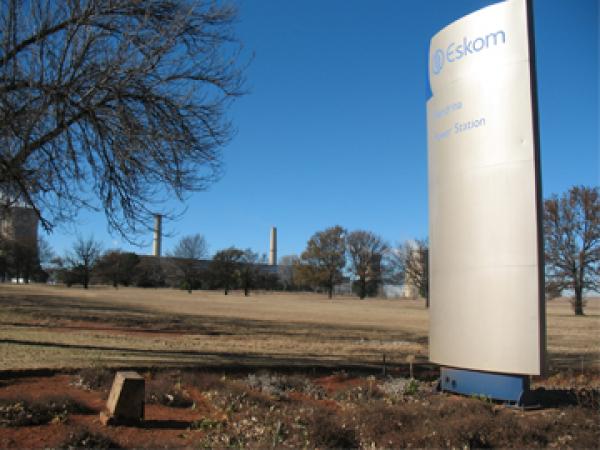

The small community of Pullenshope in Hendrina, Mpumalanga, situated less than a kilometre from the Eskom-owned Hendrina power station. Photo by Barbara Maregele.
23 June 2014
Every day at 4pm the small community of Pullenshope in Hendrina is shaken by a loud explosion, earth-shaking tremors and clouds of dust. Situated less than a kilometre from the Eskom-owned Hendrina Power Station, residents say respiratory illnesses are on the rise.
Miriam Nkosi, a resident, said plumes of dust left in the air after the blasts at the mines surrounding the power station often triggers her 6-year-old son’s asthma attacks.
“The whole house shakes where I stay in the location. There is also a big crack in the front of my house because of this. The air is full of dirt, and my son’s chest closes all the time. I’m worried for his health,” she said.
Nkosi joined more than 70 Hendrina residents who attended the Centre for Environmental Rights (CER) workshop to raise awareness about the community’s environmental rights.
Mpumalanga is home to 12 of Eskom’s 15 coal-fired power stations. According to the CER, 13.7 % of the area consists of mining and a report completed two years ago indicated a further 40.3% of the land had been set aside for prospective mining.
The workshop forms part of CER’s programme last week along with Greenpeace, groundWorx, Mejcon-SA, and other local community activists. The group visited key areas in the Mpumalanga Highveld to assess how mines and power stations have impacted on surrounding communities.
Pullenshope residents Miriam Nkosi and Gloria Bengeza at the CER workshop last week. Photo by Barbara Maregele.
At the meeting, Nkosi said clouds of dust could often be seen inside her home.
“Once the blast went off, the dust comes straight into the community … the dust goes everywhere, outside and inside the house. Other people in the community are very sick,” she said.
Nkosi said a few years ago, her family would buy bottled water from Middelburg, but this soon became too costly.
“We boil our water before putting it into the fridge. I’m still not sure if it’s safe for my son, but we have no other choice,” she said.
Another resident, Gloria Bengeza, 56, said she had high water bills as dust from the blasts dirtied her windows and washing.
“The dust is thick and it stays in the air the whole afternoon. We waste a lot of water because we always have to wash our windows. If we have clothing on the washing line, it gets so dirty and we have to wash them all over again,” she said.
Bengeza said many community members were aware of the possible health risks and dangers, but did not know of any solutions to the problem.
“It’s good these people [the CER group] are explaining what our rights are. We see these things every day and no one can help us. At least we know that we can complain about these things and [there are] people [who] will listen to us,” she said.